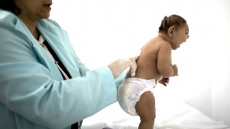Doctors are warning about vitamin D again, and it's not the "we need more" news you might expect. Instead, they say there's too much needless testing and too many people taking too many pills for a problem that few people truly have.
The nutrient is crucial for strong bones and may play a role in other health conditions, though that is far less certain. Misunderstandings about the recommended amount of vitamin D have led to misinterpretation of blood tests and many people thinking they need more than they really do, some experts who helped set the levels write in Thursday's New England Journal of Medicine .
Correctly interpreted, less than 6 per cent of Americans ages 1 to 70 are deficient and only 13 per cent are in danger of not getting enough.
That's concerning, "but these levels of deficiency do not constitute a pandemic," the authors write.
Yet people may think there is one.
Blood tests for vitamin D levels — not advised unless a problem like bone loss is suspected — are soaring. Under Medicare, there was an 83-fold increase from 2000 to 2010, to 8.7 million tests last year, at $40 apiece. It's Medicare's fifth most common test, just after cholesterol levels and ahead of blood sugar, urinary tract infections and prostate cancer screening.
"I'm not sure when it got popular to check everybody for vitamin D deficiency," but patients often ask for it, especially baby boomers, said Dr. Kenny Lin, a Georgetown University family physician and preventive medicine expert.
Vitamin D pill use also grew, from 5 per cent of Americans in 1999 to 19 per cent in 2012.
That may be due to many reports suggesting harm from too little of "the sunshine vitamin," called that because our skin makes vitamin D from sun exposure. It's tough to get enough in winter or from dietary sources like milk and oily fish, though many foods and drinks are fortified with vitamin D and labels soon will have to carry that information.

"We're not saying that moderate-dose supplements are risky, but more is not necessarily better" and high doses can do harm, said Dr. JoAnn Manson of Brigham and Women's Hospital in Boston. She and several other advisers to the Institute of Medicine, which set the RDA, or recommended dietary allowance, wrote the journal article.
People vary, biologically, in how much of any vitamin they need. The institute estimated this by comparing various intake and blood levels with measures of bone health. They estimated that, on average, people need about 400 international units of vitamin D per day, and 600 for people over 70.
To be safe and ensure that everyone gets enough, they set the RDA at the high end of the spectrum of the population's needs — 600 to 800 units, depending on age. So by definition, nearly everyone's true requirement is below that.
Many people and their doctors regard the RDA and its corresponding blood levels as a threshold that everyone needs to be above, the authors write. As a result, people often are told they are inadequate or deficient in D when, in fact, they're not.
"If you're chasing a lab number, that will lead to many people getting higher amounts of vitamin D than they need," and labs vary a lot in the quality of testing, Manson said.
The bottom line: Get 600 to 800 units a day from food or supplements and skip the blood test unless you have special risk factors, Manson said.

A big study she is helping lead is testing whether higher levels lower the risk of cancer, heart disease, stroke, memory loss, depression, diabetes, bone loss or other problems. Nearly 26,000 people have been taking 2,000 units of D-3 (the most active form of vitamin D, also known as cholecalciferol) or dummy pills every day for five years. Results are expected in early 2018.



